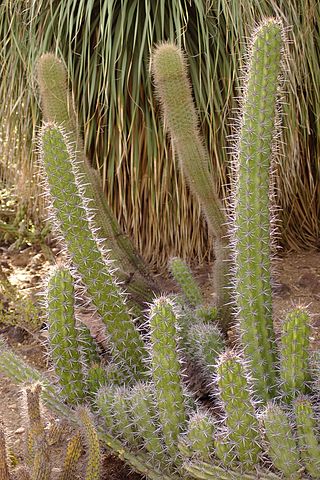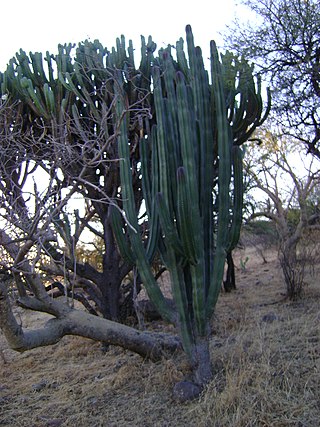
The mata mata, mata-mata, or matamata is a South America species of freshwater turtle found in the Amazon basin and river system of the eastern Guianas. It was formerly believed to also occur in the Orinoco basin, western Guianas and upper Rio Negro–Branco system, but in 2020 these populations were found to belong to a separate species, Chelus orinocensis. Subsequently, some authorities have modified the common name of Chelus fimbriata to Amazon mata mata. These two are the only extant species in the genus Chelus.

The common flat-tail gecko is a gecko endemic to Madagascar. It is found in eastern Madagascar and on the islands Nosy Bohara and Nosy Mangabe. These geckos live in tropical rain forests. They reach a total length of 330 mm.

Stenocereus is a genus of columnar or tree-like cacti from the Baja California Peninsula and other parts of Mexico, Arizona in the United States, Colombia, Costa Rica, Guatemala, Venezuela and the West Indies. The genus has been enlarged by the addition of species from several other genera. A close relative is the peculiar chinoa or chende cactus, Polaskia chende.

Stenocereus eruca, commonly known as the creeping devil, is a member of the family Cactaceae. It is one of the most distinctive cacti, a member of the relatively small genus Stenocereus. It is endemic to the central Pacific coast of Baja California Sur, and is found only on sandy soils, where it forms massive colonies.

Amaranthus fimbriatus is a species of glabrous flowering plant in the Amaranthaceae family. It is commonly known as fringed amaranth or fringed pigweed. The plant is an annual herb that can often grow up to 0.7 m (2 ft.) in height. The flower is greenish to maroon. It is found in North America and in Mexico. It often grows on sandy, gravelly slopes, semideserts or in disturbed habitats. It usually blooms after the summer rains in these arid regions. It is considered to be an invasive weed.

The raft spider, scientific name Dolomedes fimbriatus, is a large semi-aquatic spider of the family Pisauridae found throughout north-western and central Europe. It is one of only two species of the genus Dolomedes found in Europe, the other being the slightly larger Dolomedesplantarius which is endangered in the UK.

Stenocereus thurberi, the organ pipe cactus, is a species of cactus native to Mexico and the United States. The species is found in rocky desert. Two subspecies are recognized based on their distribution and height. The Organ Pipe Cactus National Monument is named for the species.

Chelus is a genus of large freshwater turtles found in tropical South America. Formerly considered to be a monotypic genus, it now consists of two species after Chelus orinocensis was identified in 2020 from a genetic analysis.

The fringed fruit-eating bat, is a species of bat native to South America.

The fringed long-footed myotis is a species of vesper bat in the family Vespertilionidae. It is found in China, Taiwan and Hong Kong.

Ctenosaura palearis, commonly known as the Motagua spiny-tailed iguana, is a species of spiny-tailed iguana endemic to the Motagua Valley in Guatemala.
The Kashmir flying squirrel is a species of rodent in the family Sciuridae. It is monotypic within the genus Eoglaucomys. It is found in Afghanistan, India and Pakistan. Its natural habitat is subtropical or tropical dry forests. It is threatened by habitat loss. The Afghan flying squirrel is usually considered a subspecies.

Stenocereus alamosensis is a species of cactus native to Mexico. It is viviparous, apparently an adaptation to living in coastal plains which are prone to flooding. The Seri people of Sonora call this cactus xasaacoj. The specific epithet, alamosensis, refers to the plant's occurrence at Álamos in the Mexican state of Sonora, in northwestern Mexico.

Stenocereus griseus, also known as the Mexican organ pipe, dagger cactus, pitaya, and pitayo de mayo, is a species of cactus.

Stenocereus pruinosus is a species of cactus. It is endemic to Mexico and occurs in the states of Veracruz, Puebla, and Oaxaca.

Stenocereus gummosus is a flowering plant in the family Cactaceae that is found in Baja California, Mexico at elevations of 9 to 134 meters

Stenocereus stellatus is a flowering plant in the family Cactaceae that is found in Oaxaca, Mexico
The Coomsaharn char is a species of lacustrine char fish in the family Salmonidae.

Stenocereus montanus, known as sahuira, is a species of columnar cactus in the family Cactaceae. It is endemic to Mexico where it is found from Sonora to Colima.

Stenocereus treleasei is a species of flowering plant in the family Cactaceae, native to Oaxaca in Mexico.

















